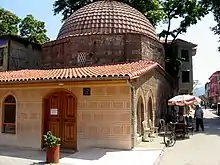Haji Özbek Mosque
Haji Özbek Mosque (Turkish: Hacı Özbek Camii) is a historical Ottoman mosque in İznik, Turkey.
| Haji Özbek Mosque | |
|---|---|
Hacı Özbek Camii | |
 | |
| Religion | |
| Affiliation | Islam |
| Location | |
| Location | Iznik, Turkey |
| Architecture | |
| Type | Mosque |
| Style | Islamic, Ottoman architecture |
| Completed | 1333 |
| Specifications | |
| Length | 7.92 m (26.0 ft) |
| Width | 7.92 m (26.0 ft) |
| Dome(s) | Hemispheric |
The Mosque
The Haji Özbek Mosque (1333) in Iznik, which was the first important centre of Ottoman art, is a prime example of Ottoman single-domed mosque, which illustrates a combination of Byzantine building techniques and Muslim needs.[1] According to the inscriptive plaque (kitabe) above a window, the mosque was built by Haci Özbek bin Muhammed in the year 1333 (734 A.H.), two years after the Ottoman conquest of İznik by the Ottoman sultan Orhan I.[2] The building is a single-unit mosque composed of a square hall crowned with a dome, which is eight metres (26 ft) in diameter. The drum of the dome of the mosque is dodecagonal and adorned with a band of triangular planes on the interior. The mosque consists of a triple layer of brick with alternating layers of individually cut stone separated by vertically laid brick.[3]
In 1939 the three-bay portico preceding the hall to the west was demolished, to make space for road expansion. The portico, was roofed with a barrel vault to the south and a mirror vault on the north. In the place of the demolished portico, a new enclosed portico was added to the northern side of the building in the year 1959. The mosque never had a minaret. The ornamental details of the interior have been lost under the layers of plaster. For the construction of the mosque, brick and rubble stone, was used, together with saw-toothed brick cornices at the top of the walls and terracotta tiles were used on the brick dome.
References
- Sultanates and Gunpowder Empires, Ira M. Lapidus, The Oxford History of Islam, Ed. John L. Esposito, (Oxford University Press, 1999), 371.
- Sheila Blair and Jonathan Bloom, The Art and Architecture of Islam, 1250-1800, (Yale University Press, 1994), 134.
- Ottomans,Andrew Petersen, Dictionary of Islamic Architecture, (Routledge, 1996), 217.
- History of Ottoman Architecture, J. Freely, 2010



.svg.png.webp)